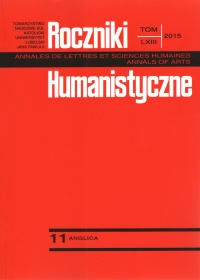High time to talk about noon
Abstract
The paper re-examines a well-known semantic change observed in the history of the English word noon. The received academic opinion is that the word originates from the Latin phrase nōna hora > nōna ‘the ninth hour’ and was originally used in the medieval context to denote the ninth hour of the day, i.e. about three o’clock p.m., and, by metonymy, also the prayer at the ninth hour of the day prescribed by The Rule of St Benedict. Due to the central role of The Rule of St Benedict in the organisation of daily monastic life in the Middle Ages, the Latin word nōna was borrowed into vernaculars of the countries which adopted The Rule. It appeared in Old English as nōn, in Middle Dutch as nōne, noene, in Old Saxon as nōn, nōna, in Middle Low German as nōna, etc. The available historical and etymological dictionaries of English date the beginning of change in the English word noon to the 12/13th century and claim that it was complete by the 14th century. In effect, the word started to denote ‘midday’ rather than ‘three o’clock p.m.’, and the change is traditionally associated with “anticipation of the ecclesiastical office or of a meal-hour.” The paper reassesses the strength of these assertions on the basis of an examination of the medieval system of time-keeping and the analysis of the monastic horarium, in particular the relationship between meal times and prayer times. It is shown that the explanation for the change put forward in the current sources relies on a misinformed view of medieval reality. I put forward an alternative explanation of the change, which is consonant both with the medieval system of time-keeping and with the monastic daily regime.
References
Blackburn, Bonnie, & Leofranc Holford-Strevens. 1999. The Oxford companion to the year. Oxford: Oxford University Press.
Burton, Janet. 1994. Monastic and religious orders in Britain, 1000-1300. Cambridge: Cambridge University Press.
Burton, Janet, & Julie Kerr. 2011. The Cistercians in the Middle Ages. Woodbridge: The Boydell Press.
Charzyńska-Wójcik, Magdalena. (2015). “Medieval multilingualism at noon: A preliminary report on insufficiency.” In Wojciech Malec, Marietta Rusinek, & Anna Sadowska (eds.). Challenging ideas and innovative approaches in applied linguistics. Lublin: Wydawnictwo KUL.
Clark, James G. (ed.). 2007. The culture of medieval English monasticism. Woodbridge, NY: Boydell Press.
Clark, James G. 2011. The Benedictines in the Middle Ages. Woodbridge: The Boydell Press.
Dalley, Stephanie (ed.). 1998. The legacy of Mesopothamia. Oxford: Oxford University Press.
Dictionnaire du Moyen Français (1330-1500). Retrieved from http://www.atilf.fr/dmf.
Ferzoco, Geoge, & Carolyn Muessig (eds.). 2000. Medieval monastic education. London: Leicester University Press.
Glennie Paul, & Nigel Thrift. 2009. Shaping the day: A history of timekeeping in England and Wales 1300-1800. Oxford: Oxford University Press.
Godefroy, Frédéric (1880–1895). Dictionnaire de l’ancienne langue française et de tous ses dialectes du IXème au XVème siècle. Retrieved from http://micmap.org/dicfro/search/dictionnaire-gode froy/.
Holford-Strevens, Leofranc. 2005. The history of time: A very short intoduction. Oxford: Oxford University Press.
Holthausen, Ferdinand. 1974. Altenglisches etymologisches Wörterbuch. Heidelberg: C. Winter.
Kerr, Julie. 2009. Life in the medieval cloister. London: Continuum.
Klein, Ernest. 1971. A comprehensive etymological dictionary of the English language. Amsterdam: Elsevier.
Knowles, Dom David. 1940 [1963]. The monastic order in England: A history of its development from the times of St Dunstan to the fourth Lateran Council 940-1216. Cambridge: Cambridge University Press.
Knowles, Dom David. 1955 [2004]. The religious orders in England. Volume II: The end of the Middle Ages. Cambridge: Cambridge University Press.
Latham, Ronald Edward. 1983. Revised medieval Latin word-list, from British and Irish sources. London: Oxford University Press.
Lippincott, Kristen (ed.). 1999. The story of time. London: Merrell Holbertson with the National Maritime Museum.
Macey, Samuel L. (ed.). 1994. Encyclopedia of time. New York, NY: Garland Reference Library of Social Science.
North, John David. 2007. “Monastic Time.” In James G. Clark (ed.). The culture of medieval English monasticism. Woodbridge, NY: Boydell Press, 203-211.
North, John. 2008. Cosmos: An illustrated history of astronomy and cosmology. Chicago, ILL: University of Chicago Press.
Middle English Dictionary = Hans Kurath, Sherman McAllister Kuhn, John Reidy, Robert E. Lewis, et al. (eds.). 1952–2001. Middle English Dictionary. Ann Arbor, MI: University of Michigan Press, from http://quod.lib.umich.edu/m/med/.OED.
Online Etymology Dictionary http://www.etymonline.com/.
Oxford English Dictionary (latest edition online). Retrieved from http://www.oed.com.
Oxford English Dictionary = John Simpson, & Edmund Weiner (eds.). (1989). Oxford English Dictionary. 2nd edition. Oxford: Clarendon Press.
Partridge, Eric. 1958 [1966/2006]. Origins: A short etymological dictionary of Modern English. London: Routledge.
Pfaff, Richard W. 2009. The liturgy in medieval England: A history. Cambridge: Cambridge University Press.
Room, Adrian. 1986. Dictionary of changes in meaning. London: Routledge & Kegan Paul.
Rothwell, William. 1991. “The missing link in English etymology: Anglo-French.” Medium Aevum 60, 173–196. Retrieved from http://www.anglo-norman.net/articlesA/missinglink. xml?session=S382061372240626#ANH-AAA-003-188-87-S.
The Rule of St Benedict. Retrieved from http://image.ox.ac.uk/show?collection=corpus&manuscript =ms197
Scragg, Donald George. 1974. The history of English spelling. Manchester: Manchester University Press.
Skeat, Walter W. 1888. An etymological dictionary of the English language. Oxford: Clarendon Press.
Steward, Gregory, William Rothwell, & David Trotter. 2005. Anglo-Norman dictionary. London: Maney Publishing for the Modern Humanities Research Association. Retrieved from www.anglo-norman.net/.
SunriseSunset at http://www.sunrisesunset.com/.
Whitrow, Gerald J. 1988. Time in history: Views of time from prehistory to the present day. Oxford: Oxford University Press.
Wogan-Browne, Jocelyn. 2013. “What voice is that language / What language is that voice? Multilingualism and identity in a medieval letter-treatise.” In Judith A. Jefferson, Ad Putter, & Amanda Hopkins (eds.), Multilingualism in medieval Britain (c. 1066-1520): Sources and analysis. Turnhout: Brepols. 171-194.
Wróblewski, Andrzej Kajetan. 2006. Historia fizyki od czasów najdawniejszych do współczesności. Warszawa: Wydawnictwo Naukowe PWN.
Copyright (c) 2015 Roczniki Humanistyczne

This work is licensed under a Creative Commons Attribution-NonCommercial-NoDerivatives 4.0 International License.





